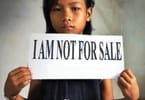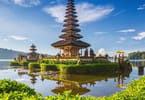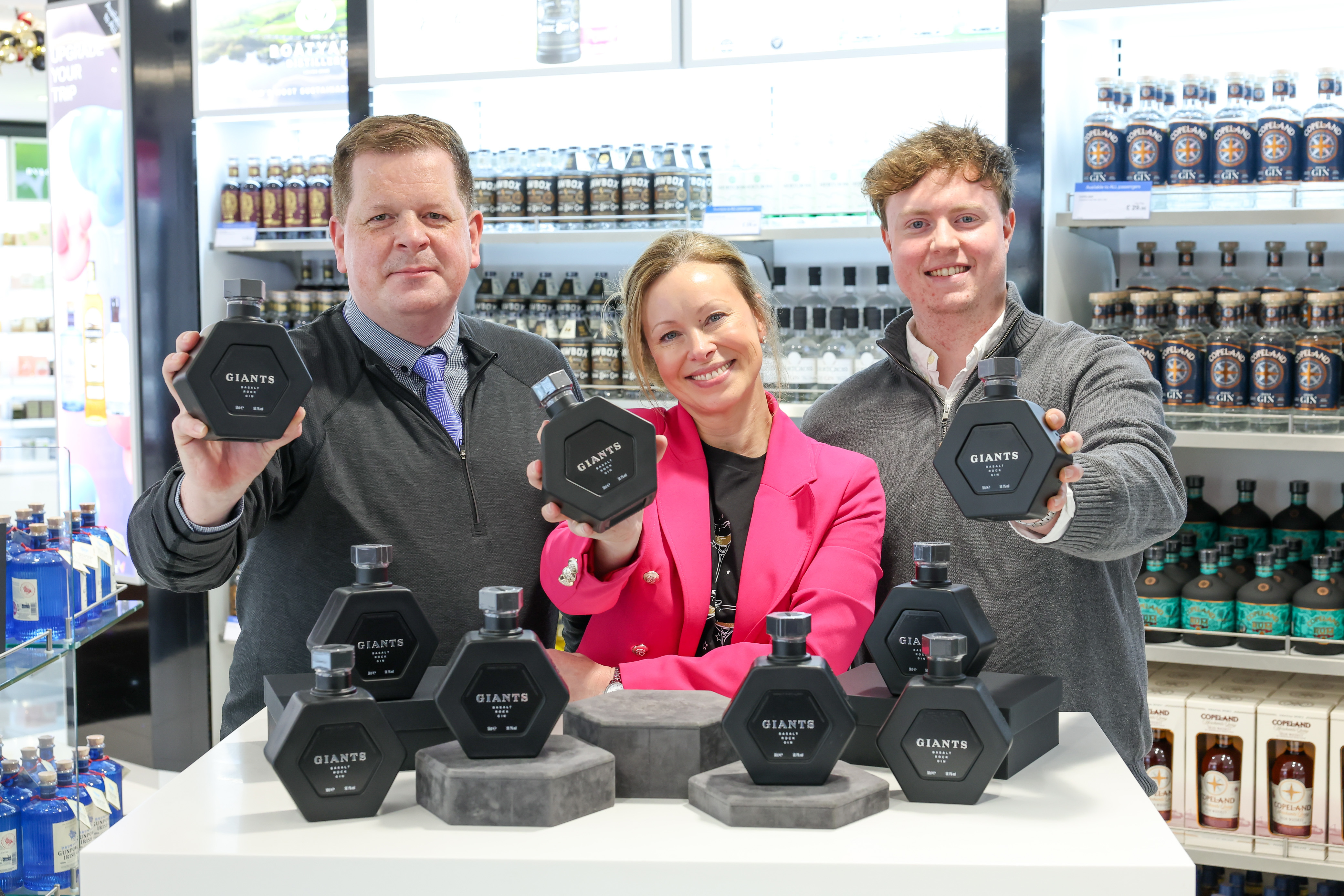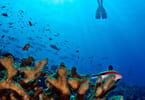- Nauru is a tiny island and an independent country northeast of Australia. It is situated 42 kilometers south of the equator.A coral reef surrounds the entire island which is dotted with pinnacles..
- Population – approximately 10,000 including non-Nauruan population of approx. 1,000
- There are no Coronavirus cases in the country, but the US Government is recommending to be vaccinated when traveling to Nauru
When looking up world statistics on Coronavirus, one independent country is always missing. This country is the Republic of Nauru. Nauru is an island republic in the South Pacific Ocean
The people of Nauru are comprised of 12 tribes, as symbolized by the 12-pointed star on the Nauru flag, and are believed to be a mixture of Micronesian, Polynesian, and Melanesian descent. Their native language is Nauruan but English is widely spoken as it is used for government and commercial purposes. Every tribe has its own chief.
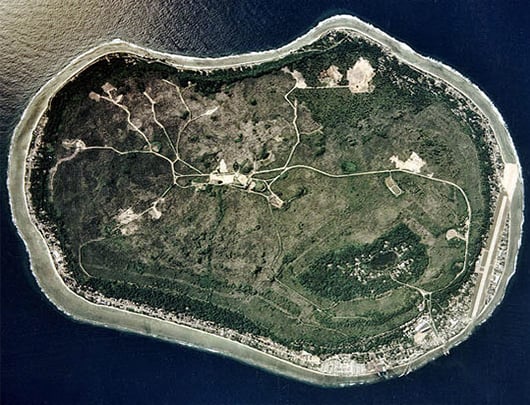
The Nauru Flag is very simple and plain, with the colors Navy Blue, Yellow, and White. Each of the colors has significance. The Navy Blue represents the ocean around Nauru. The yellow line is in the middle of the Equator because Nauru is right next to the Equator and that’s why Nauru is very hot. The white 12 pointed star stands for the 12 tribes of the People of Nauru.
That’s why the Nauruan flag is colored like this.
The resumption of phosphate mining and exporting in 2005 gave Nauru’s economy a much-needed boost. The secondary deposits of phosphate have an estimated remaining life of about 30 years.
A rich deposit of phosphate was discovered in 1900 and in 1907 the Pacific Phosphate Company shipped the first shipment of phosphate to Australia. To this day phosphate mining has remained Nauru’s main source of economic revenue.
The 31st January is Independence Day (Return from Truk anniversary)
This national day is celebrated by the government, organizing games and choral competitions for the various government departments and instrumentalities. Also, there is a banquet held for the young at hearts.(mostly survivors of Truk)
The 17th May is Constitution Day
This day is celebrated by the whole island having a track and field competition between the 5 constituencies.
The 1st July is NPC/RONPhos Handover
Nauru Phosphate Corporation took over phosphate mining and shipping on Nauru after buying it from the British Phosphate Commission. Then RONPhos took over from N.P.C in 2008.
The 26th October is ANGAM Day
Angam means coming home. This national day commemorates the return of the Nauruan people from the brink of extinction. Each community usually organizes its own festivities as this day is usually celebrated with family and loved ones.
When a child is born he/she will inherit their tribe from their mother’s side. Clothing for each tribe is all different which helps identify each individual.
List of the 12 Nauru tribes:
- Eamwit – snake/eel, sly, slippery, good at lying and copier of styles.
- Eamwitmwit – cricket/insect, vain beautiful, tidiness, with a shrill noise and manner alike.
- Eaoru – destroyer, harms plans, jealous type.
- Eamwidara – dragonfly.
- Iruwa – stranger, foreigner, a person from other countries, intelligent, beautiful, masculine.
- Eano – straightforward, mad, eager.
- Iwi – lice (extinct).
- Irutsi – cannibalism (extinct).
- Deiboe – small black fish, moody, cheater, behavior can change any time.
- Ranibok – object washed ashore.
- Emea – user of rake, slave, healthy, beautiful hair, cheat in friendship.
- Emangum – player, actor
For all visa applications including for visiting media personnel, an email request to enter Nauru should be sent to Nauru Immigration.
Australian dollars is the legal tender in Nauru. Foreign exchange at any outlet will be difficult. Cash is the only form of payment in Nauru.
Credit/debit cards are not accepted.
There are two hotels, a government-owned and a family-owned hotel.
There are two other accommodation options (unit type) that are privately owned.
It’s always summer in Nauru, generally around the high 20s – mid-30s. Summer clothing is recommended.
Summer clothing/casual wear is acceptable but if making appointments with Government officials or attending church services, it is recommended to dress appropriately. Swimsuits are not a norm in Nauru, swimmers can either wear a sarong over them or shorts.
There is no public transport. Car hire is recommended.
- Fruit trees are coconut, mango, pawpaw, lime, breadfruit, sour sop, pandanus. The indigenous hardwood is the tomano tree.
- There are a variety of flower trees/plants but the most widely used/favoured are the franjipani, iud, hibiscus, irimone (jasmine), eaquañeiy (from tomano tree), emet and yellow bells.
- Nauruans eat a variety of seafood but fish is still a favourite food of Nauruans – raw, dried, cooked.
There is no known COVID-19 case on Nauru, no reports had been made to the World Health Organization, but the US Government recommends for its citizen that this unknown status is risky, even fully vaccinated travelers
COVID-19 Testen
- There are PCR and/or antigen tests available on Nauru, results are reliable and within 72 hours.
- Oxford-Astra Zeneca vaccine is available in the country
Nauru has a national story:
Once upon a time, there was a man called Denunengawongo. He lived under the sea with his wife, Eiduwongo. They had a son whose name was Madaradar. One day, his father took him up to the surface of the water. There he drifted about until he reached the shore of an island, where he was found by a beautiful girl named Eigeruguba.
Eigeruguba took him home, and later the two were married. They had four sons. The eldest was called Aduwgugina, the second Duwario, the third Aduwarage and the youngest was called Aduwogonogon. When these boys grew up to be men, they became great fishermen. When they had become men, they lived apart from their parents. After many years, when they parents had become old, their mother had another baby boy. He was called Detora. As he was growing up, he liked to stay with his parents and hear the storied they told. One day, when he was almost grown to manhood, he was out walking when he saw a canoe. He went to them, and they gave him some of their smallest fish. He took the fish home and gave them. Next day, he did the same thing but, on the third day, his parents told him to go out fishing with his brothers. So he went them in their canoe. When they returned that evening, the brothers gave Detora only the smallest fish. So Detora went home and told his father about it. Then his father taught him how to fish, and told him about his grandparents, who lived under the sea. He told him that, whenever his line stuck, he must dive down for it. And when he came to the home of his grandparents, he must enter and ask his grandfather to give him the hooks which he had in his mouth; and he must refuse any other hooks that were offered to him.
Next day, Detora woke up very early and went to his brothers. They gave him a fishing line with many knots in it, and a piece of straight stick for a hook. Out at sea, they all threw their lines in, and, every now and then, the brothers would catch a fish; but Detora caught nothing. At last, he became tired and his line got caught in the reef. He told his brothers about it, but they only jeered at him. At last, he dived in. As he did so, they said to themselves, ‘What a stupid fellow he is, that brother of ours!’ After diving in, Detora reached the home of his grandparents. They were very surprised to see such a boy come to their home.
‘Who are you?’ they asked. ‘I am Detora, son of Madaradar and Eigeruguba’ he said. When they heard the names of his parents, they welcomed him. They put a number of questions to him, and showed him great kindness. At last, as he was about to depart, remembering what his father had told him, he ask his grandfather to give him a hook. His grandfather told him to take any hooks he liked from the roof of the house.
- Nauru is COVID-free. A biweekly flight between Nauru and Brisbane, Australia continues to operate. All travelers to Nauru require prior approval from the Government of Nauru.
The Damo men threw in their lines again, and this time they caught a different kind of fish. ‘What is the name of this one?’ they asked. And Detora replied, ‘Eapae!’ Again the name wasthe right one. This made the Damo fishermen angry. Detora’s brothes were very surprised at his cleverness. Detora now threw out his line and pulled up a fish. He asked the Damo men its name. They replied ‘Irum’ but when they looked again, they found that they were wrong, for there was a black noddy on the end of the line. Again Detora threw in his line and again he asked them to name the fish. ‘Eapae,’ they said. But when they looked they found a basket of pork on the end of Detora’s line.
By now the Damo men were very frightened, for they realized that Detora was using magic.
Detora’s canoe was pulled close beside the other one, and he and his brothers killed the Damo men and took all their fishing gear. When the people ashore saw all this, they knew that their men had been defeated in the fishing competition, for it was the custom in those days for the winners of such fishing competition to kill their opponents and take the fishing gear. So they sent out another canoe. The same thing happened as before, and the people of Damo became very frightened and fled from the beach. Then Detora and his brothers pulled their canoe towards the shore. When they got to the reef, Detora tipped the canoe over with his four brothers underneath; the canoe turned into a rock. Detora landed alone on the island. Soon, he met a man who challenged him to a competition in catchingearamaeand fish on the reef. They saw one and both began to chase it. Detora succeeded in catching it, whereupon he killed the other man and went off. Farther along the beach, Detora won the competition also, and killed his challenger.
Detora now set out to explore the island. Becoming hungry, he climbed a coconut tree and dropped down some ripe nuts, the milk of which he drank. With the husks of the coconut, he made three fires. When the fires were burning brightly, he threw some coconut flesh on, and this made a sweet smell. Then he lay down on the sand a few yards away from the fires. He was almost asleep when he saw a grey mouse approach the fires. It ate the coconut from the first two fires and, just as it was about to eat the coconut from the third fire, Detora caught it and was going to kill it. But the little mouse begged Detora not to kill it. ‘Let me go, please, and I will tell you something’ it said. Detora released the mouse, which began to run away without keeping its promise. Detora caught the mouse again, and picking up a small sharp piece of stick, threatened to pierce through the mouse’s eyes with it. The mouse became afraid and said, ‘Roll that small stone off the top of that large rock and see what you find’. Detora rolled away the stone and found a passage leading underground. Entering the hole, he made his way along a narrow passage until he came to a road with people walking to and fro.
Detora could not understand the language they spoke. At last he found on young man who spoke his language, and to him Detora told his story. The young man warned him against the many perils of the new land, and directed him along his road. Detora came at last to a place where he saw a platform covered with fine mats of beautiful designs. On the platform sat a Queen Louse, with her servants around her.
The queen welcomed Detora , and fell in love with him. When, after a few weeks, Detora wished to return home, the Louse-Queen would not allow him to leave. But, at last, when he told her of his four brothers under the stone who could not be released except by his magic spell, she allowed him to proceed. A number of people he met wanted to do harm to the stranger, but Detora overcame them all with magic spell.
A last they came to the rock where Detora had left his brothers. He stooped down, repeated a magic spell, and the big rock changed into a canoe containing his four brothers. Together the brothers set sail for their own land.
After many days at sea, they saw the home island in the distance. As they approached it, Detora told the brothers he was going to leave them and go down to live with their grandparents at the bottom of the sea. They tried to coax him to remain with them, but he jumped over the side of the canoe, and down he went. The brothers made their way to their parents and recounted their adventures.
When Detora reached the home of his grandparents, they gave him a fine welcome. After the grandparents died, Detora became king of the Sea and the Great Spirit of Fishing and Fishermen. And nowadays, whenever fishing lines or hooks are lost from a canoe, it is known that they are lying on the roof of Detora’s house.
WAT VUN DESEN ARTIKEL WEI HUELEN:
- The people of Nauru are comprised of 12 tribes, as symbolized by the 12-pointed star on the Nauru flag, and are believed to be a mixture of Micronesian, Polynesian, and Melanesian descent.
- The yellow line is in the middle of the Equator because Nauru is right next to the Equator and that’s why Nauru is very hot.
- A rich deposit of phosphate was discovered in 1900 and in 1907 the Pacific Phosphate Company shipped the first shipment of phosphate to Australia.




